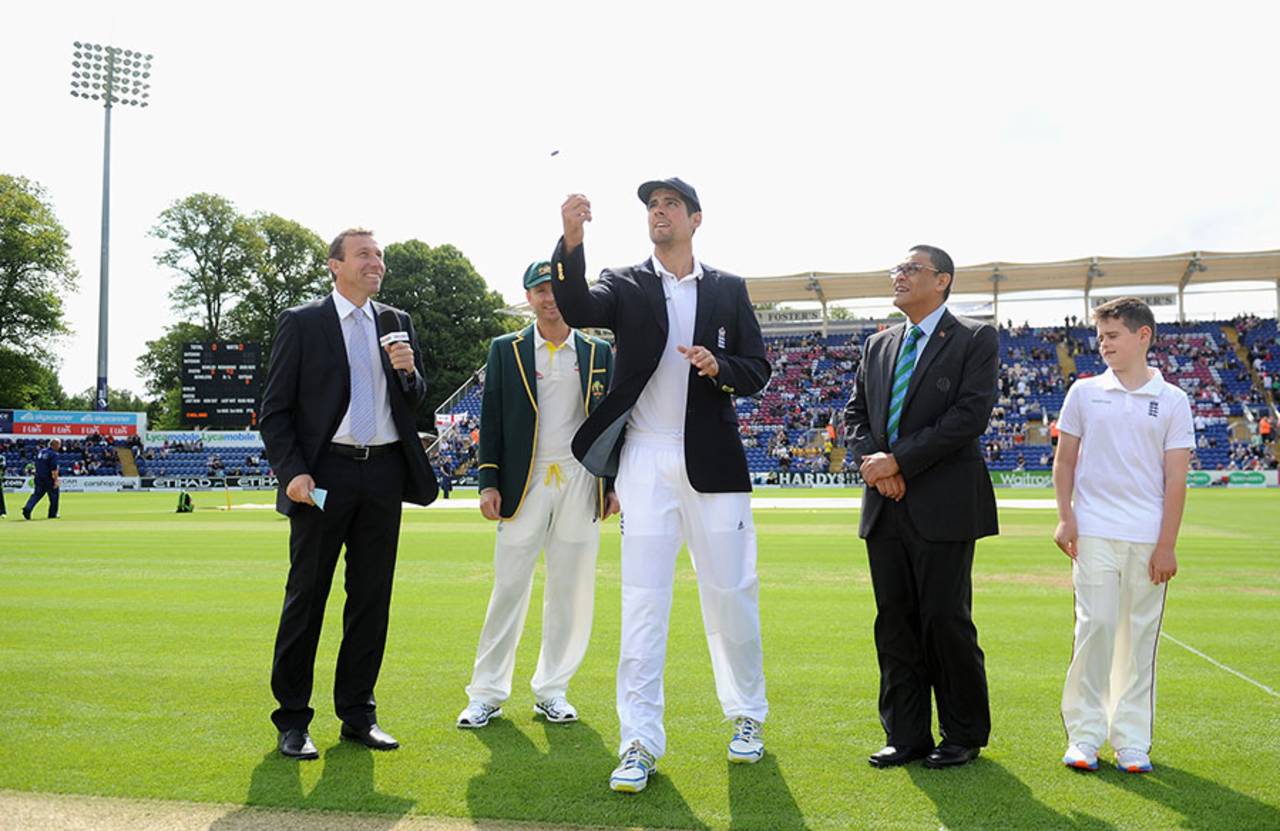Is it time to rethink the toss?
Why not let captains decide what batting or bowling first is worth and use runs to buy the advantage?
Jon Hotten
31-Jul-2015

The toss might be antiquated, but it has symbolic value • Getty Images
One of the myriad suggestions for "improving" Test match cricket is to abandon the toss in favour of giving the visiting captain the choice of whether to bat or bowl, thus negating the home side's opportunity to doctor a pitch in their favour.
As with many apparently simple things - and you don't get much more binary than the toss of a coin - it hides its complexity in unexpected ways. As a piece of sporting symbolism it is perfect: no matter how mismatched the two sides may be, the captains come together at the start with a gesture of absolute equality. The toss is ritualistic and it offers a focus for the start of every game.
It can reveal the psychology and the superstitions of the captains. Some always call the same way. Michael Clarke has won twice in this Ashes series by varying his call. Michael Vaughan admitted that in the 2005 series he flipped the coin miles in the air simply to prolong the uncertainty.
Beyond these ritualistic skirmishes, the toss has a deeper value. It's a value that varies with conditions and it is shifting with history as the game advances, but it exists and is worth paying attention to. Last autumn a statistician called David Franklin wrote a wonderful piece for Wisden's quarterly journal The Nightwatchman that revealed that although the act of flipping the coin and calling is equal, the outcome is not. He analysed the 1397 Test matches that had, to date, produced a positive result and found that 53% of those were won by the side winning the toss, a number high enough to pass the statistically significant "95% confidence" level that suggests this is not merely natural variation.
Franklin went further, calculating that the batting average of players in the side winning the toss was, at 32.81, 1.41 runs higher than the team losing the toss at 31.40. Multiplied out over the 20 available wickets, it positioned a value of winning the toss at 28 runs (or just less than one wicket, if a wicket is worth around 31 runs).
Franklin's more surprising statistics revealed that since 1970, captains who have won the toss and bowled first have won 179 games and lost 150
This value has dropped from around 40 runs that winning the toss offered in the era of uncovered pitches, and there has been a corresponding fall in the number of captains opting to bat first - 89% did in the uncovered era, compared to 66% now. One of Franklin's more surprising statistics revealed that since 1970, captains who have won the toss and bowled first have won 179 games and lost 150. Perhaps bowling first is an underrated tactic, the perception of it skewed by famous disasters like Nasser Hussain's in Brisbane in 2002 and Ricky Ponting's at Edgbaston in 2005.
The toss has always battled conditions because its value is greater in some places than in others. Franklin's analysis showed that in Sri Lanka the toss is worth an average of 60 runs, in England 58, India 28, and in South Africa just seven runs. New Zealand is unique in having a negative value (-12 runs) suggesting that the decision to bat or bowl in the rapidly varying conditions there is a toss up in more ways than one.
Franklin's suggestion for a system to replace the toss is more complex than simply handing the advantage to the visiting captain. He proposes a "sealed bid" system, where each captain assesses conditions and then makes an offer of a certain number of runs to be traded for having the choice of whether to bat or bowl, thus introducing a tactical element to the process - captains would be forced to decide what batting or bowling is actually worth.
It's a lovely notion, one that would keep a pub debate warm for hours. While we may baulk at the thought of "imaginary" runs intruding on real cricket, it reinforces the idea that the choice that the toss creates is important and that both teams need to have a stake in it. Surrendering it to the away captain as a tool to discourage the rigging of pitches is throwing away a dramatic and necessary element of the game to solve a problem that is only tangentially connected to it.
Jon Hotten blogs here. @theoldbatsman